We lived on our boat for a while here on the Puget Sound. I wouldn’t call us seasoned live-aboards, but I felt we got enough of a taste of it to get a good idea of what it is all about. From 90 F and beautiful, to torrential cold monsoon rain, to sub freezing snow and ice on the decks – we got a taste of all the weather the Pacific Northwest has to offer.
I’m not going to write a top ten list about this, because I hate top ten lists. I’m just going to write out everything that comes to mind, as it comes to mind…here goes…
What definitely sucks…
Doing laundry at a laundry mat – It’s hard to think of a worse way to spend your Saturday than hauling all your laundry up to a sub-par coin-op laundry mat which actually makes your clothes dirtier. Did you know people like to wash their filthy smelly hairy dog rugs at laundry mats, because the mat is too disgusting to use their own washing machine at home?
Lack of good bathroom/shower facilities – Showering on your boat regularly in this climate is not a good idea. Also, using your head a lot means you need to pump out a lot. So, you’re at the mercy of what’s on shore. Remember those nice long hot showers you use to take with your other half? Not so easy on a boat or in gender separated shore side facilities.
Condensation – The bane of all live-aboards. Get a dehumidifier. Don’t do a lot of cooking when it is cold outside, unless you want it raining inside the boat, not to mention the potential for fungi that results. Why don’t they insulate boats?
Cold rain, dreary skies, endless winter – When you can’t go outside and enjoy your cockpit, your boat starts to feel really confining. A full cockpit enclosure would be a real good thing to have in the cold wet months, but they are really expensive, and I think they’d detract from the summer sailing experience.
Storage – We downsized quite a bit, but still found the need for a small storage unit for stuff we weren’t prepared to part with yet. We are both working professionals, so having a place to put all of our work clothes was challenging. It seemed we were living halfway out of our VW Westfalia for storage. I kept all my work shirts at work. We locked our bikes up at a nearby bike rack. We began to feel like our stuff was spread all over the place, making things more difficult, not simpler – one of the main reasons for moving aboard in the first place.
What kind of sucks, but really isn’t that bad
Pumping out – We have a marina with a distributed pump out system, so we don’t need to leave our slip to pump out. I could imagine this would be more of an annoyance if we had to motor to a pump out station all the time.
Filling water tanks – We have about 80 gallons of water storage, so don’t need to refill all that often. Still, when it’s cozy inside and 40 F and raining outside, and you just ran out of water for making dinner, it’s a hassle to go outside, grab the hose and fill the tanks. Oh, and if it’s below freezing, the hose is frozen, so you cannot get any water until it warms up outside. So you need to plan ahead and top off the tanks if you see a cold front moving in.
Non-sailing people’s comments – Not sure how many times I’ve heard something along the lines of “Are you sailing there?” or “A house won’t sink, isn’t the boat going to sink?” or some sort of pirate or Captain Ron reference. They mean well, it just gets old.
The stigma – Seriously, why is there such a crackdown on live-aboards? Pretty much every marina “NO LIVE-ABOARDS!” Sure there are some bad-apple derelicts out there, but I’d be willing to guess most live-aboards are great citizens. Crack down on the derelicts, not all of the live-aboards. We keep our boat in better condition than 95% of the boats in most marinas, we have professional jobs, pay taxes, vote, and contribute to society.
What does not suck and is actually kind of awesome…
Boat neighbors & friends – We’ve got to meet so many amazing people and partake in so many spontaneous dock parties, it’s been great.
Boat projects (in general) – We used to own a land based home. Dry walling is about the most miserable things I can imagine. Doing boat projects are actually rewarding to me and I get a sense of accomplishment. You either need to enjoy doing your own boat work, or else have deep pockets to pay someone to do the work if you’re going to live-aboard.
Space – People always ask us if space is a big issue. Not really (although everyone who has a boat seems to want one that’s about two feet longer). It’s cozy. Boats were the original tiny house, which seems so fashionable these days. Doing with less in a more efficiently designed space, that’s what boat life is about. Unlike a tiny house, I can sail my home to Indonesia if I wanted.
Million dollar views – The houses on the hillside just above our boat are literally worth millions of dollars each. We get the same view and location for a fraction of the cost.
Having power when the power is out – We’ve had about four power outages in the last month here on Bainbridge Island. With our boat battery bank, we can ride out most power outages.
The list really could go on…
With all this, you may ask if I’d rather live on a boat than on land. The answer?
YES!
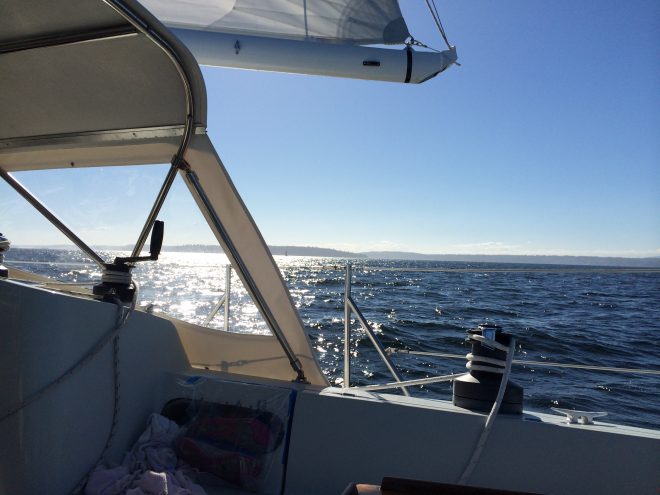
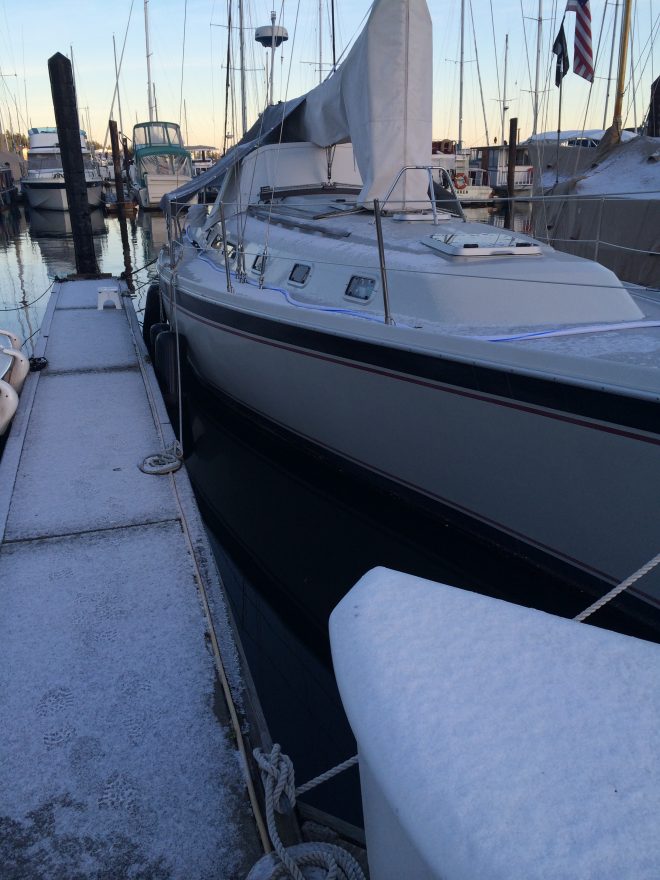
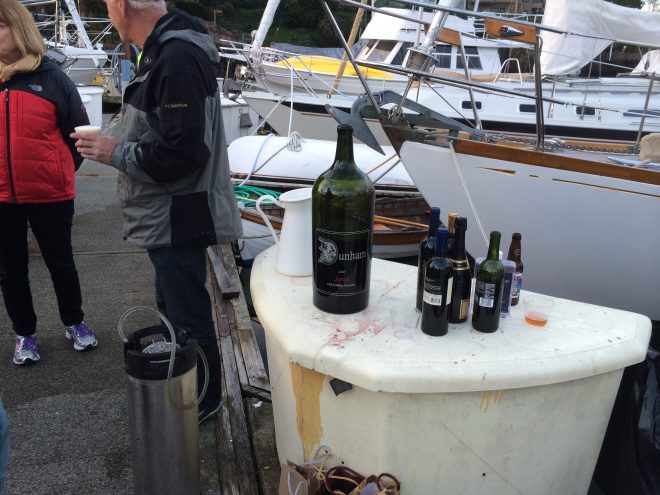
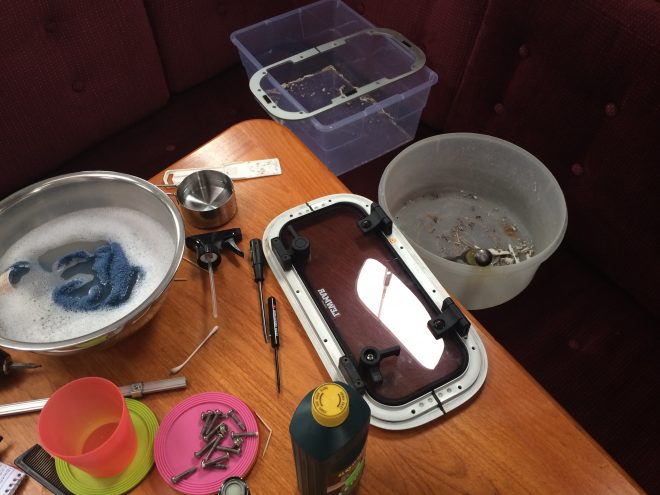
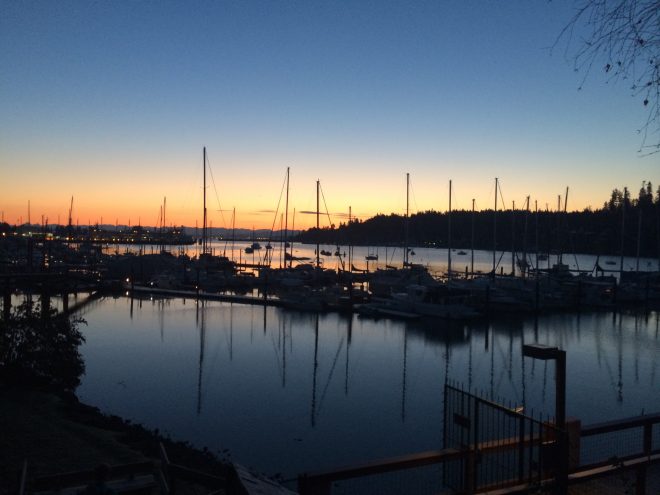
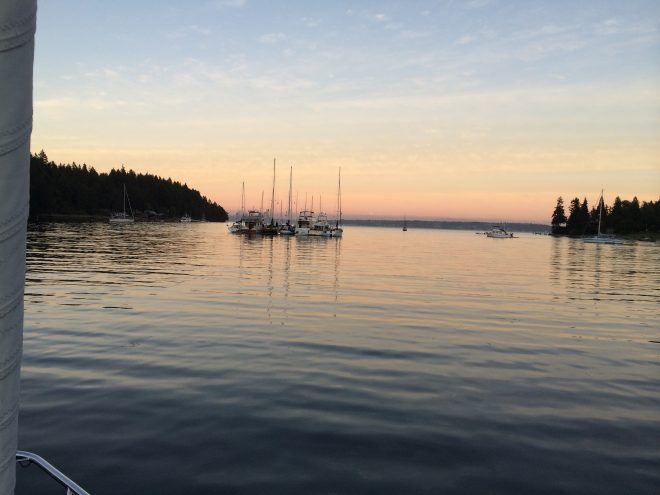
Nice list. I’m surprised you didn’t mention cooking (other than don’t do it when it’s cold outside). Seems like meals would change a good deal after living in a house. Some things we can easily cook in a kitchen with large oven, 4 burners and lots of counterspace would be very difficult on a boat (ex, Thanksgiving dinner).
Note on full enclosures – I have one (but don’t live aboard), and they’re pretty awesome in the rainy season. Keeps the cockpit dry-ish and warmer. It doesn’t detract from summer sailing because it’s completely removable. They are expensive though (prior owner paid for it fortunately).
LikeLike
I didn’t really find cooking to be that much of a hassle, at least when the weather was nice. Our galley is fairly spacious, and we have a BBQ for the nice days. I’ve found we can prepare pretty much anything on our three-burner stove/oven that we could on land, although not that 25 pound turkey. We had a nice kitchen and all sorts of specialty utensils/appliances at our old land-based home. We got rid of about 75% of our kitchen stuff and don’t really miss it. I narrowed my spice collection down from about 45 spices, to the essential 12. In the cold weather, we tried to limit using the stove/oven, and found ourselves using the toaster oven more and eating out more – mainly to reduce condensation. In my opinion, living aboard in the warm southern latitudes would be soooooo much easier than in the PNW.
LikeLike
We’ve got good showers and laundry here at Victoria, so that’s not so much an issue with us. The cost however is a bit annoying; I always find myself hoarding change. And I will admit to being annoyed during the storms we’ve had lately… we were sleeping at a 15° angle the other night, with halyards banging (someone else’s), fenders creaking (mine) and waves slapping at the transom.
And I do miss the couch: we tend to leave the salon table down and use it as lounging area.
But I am quickly becoming addicted to the lifestyle 🙂
LikeLike
Oh and I don’t understand the stigma against liveaboards either. Latitude 38 did a couple articles on sneakaboards recently, and the marina managers said they cause the most problems in the marina and create the most work for the marina management. But to me that sounds just like scapegoating the minority because it’s easy. Surely non-liveaboards cause problems and have complaints sometimes too.
A marina manager’s ideal customers would be absentee boaters who park their boat and never return to it but pay their bill monthly. This of course is not realistic, and would make for a pretty boring marina of ghost boats.
LikeLike
Those boats are creating problems too. In fact, some marinas in southern France charge a hefty surcharge (often 3 times as much) if your boat doesn’t leave for at least 1 week per year. Those boats are called “bateaux ventouses” (literally: sucker boats)
LikeLike